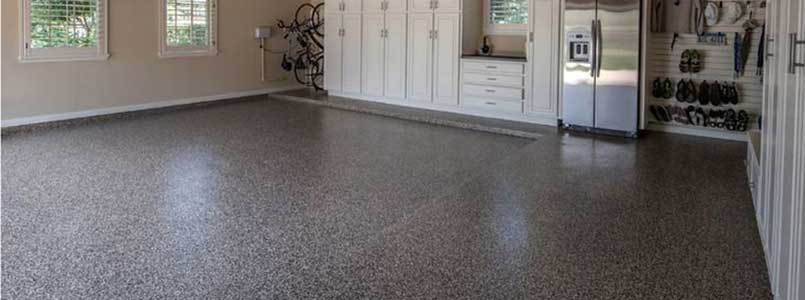Epoxy flooring is a unique flooring system that offers benefits in residential, commercial, and industrial settings. This concrete coating has gained a lot of popularity over recent years.
You may be considering this flooring system, among other choices for your next home or business floor.
To help you come to an educated decision on what flooring solution is best for you, we’ve examined the pros and cons of this popular floor. Continue reading below to learn more about the advantages and disadvantages of epoxy flooring.
Durability
Epoxy flooring is renowned for its durability. This floor coating can withstand hard impacts from heavy objects, rough abrasions without scratching, and high volumes of foot and vehicle traffic.
This increased durability helps to prevent home and business owners from dealing with expensive repairs and premature replacements.
Longevity
Thanks to the durability of this flooring system, epoxy flooring is a long-lasting concrete coating. When properly installed and maintained, an epoxy floor should last for over 25 years! This extended lifespan allows home and business owners to make the most of their floor and utilize it to the fullest!
Simple Maintenance
Maintaining an epoxy floor is quick and easy! Due to the seamless installation of epoxy, it can stay cleaner, longer, and it is simple to keep clean.
Daily sweeping or dust mopping, spot mopping as needed, and weekly wet mopping are all that’s required to maintain an epoxy floor, keeping it beautiful for as many years as possible.
Customization
Epoxy flooring is one of the most customizable floor out there. There is a myriad of colors, patterns, and textures available for epoxy flooring. From solid colors to multi-colored, intricate patterns, the choice is yours. The only limit with designing an epoxy floor is your own imagination!
Resistance
Epoxy flooring is highly resistant to a variety of chemicals and water. This nonporous floor coating can handle spills of any kind without staining or being damaged in the process. Simply clean up any spills as you usually would without the worry of ruining your floor!
Cons
Can be Slippery When Wet
Usually, epoxy floors have a smooth, glossy finish. This seamless surface can become slippery when exposed to liquids of any kind. This can lead to numerous injuries and accidents for your family or employees.
However, this disadvantage can be remedied by including a non-skid additive with your epoxy floor to increase your new floor’s traction.
Not DIY-friendly
Epoxy flooring is not a project suitable for do-it-yourselfers. The process of installing this resinous coating requires close attention to detail, proper timing, and a full crew to pull off correctly.
If you’re including patterns on your floor, this process becomes even more challenging for the average do-it-yourselfer. It’s always best to leave the installation of epoxy flooring to the professionals.
Difficult to Replace
Epoxy floors are designed to last for decades. These concrete coatings are not meant to be replaced after only a few years.
If you decide that you no longer like your floor’s color or pattern, it can be expensive and time-consuming to tear it out and replace it. When you choose to have an epoxy floor installed, you need to be sure that you’re happy with the customization options that you’ve selected.
Summing Up
Epoxy floors have a lot to offer despite a few disadvantages. Overall, the pros of this concrete coating outweigh the cons. Though this flooring system can be slippery when wet, it’s not DIY-friendly and challenging to replace. With its durability, longevity, simple maintenance, customization, and resistance, epoxy flooring has clear advantages. Hopefully, this short guide has helped you make an informed decision on your next flooring choice!

